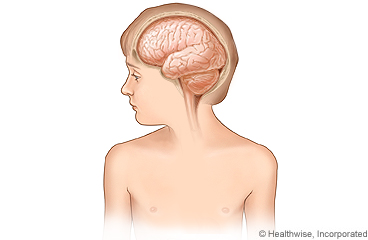
Overview
Epilepsy is a common condition that causes repeated seizures. The seizures are caused by bursts of electrical activity in the brain that aren't normal. Seizures may cause problems with muscle control, movement, speech, vision, or awareness. They can be scary.
Epilepsy affects each person differently. Some people have only a few seizures. Others get them more often.
It's normal to worry when your child has a seizure. But it's also important to help your child live, play, and learn like other children.
Your child can take medicines to control and reduce seizures. And you can find ways to help keep your child as safe as possible. You and your doctor will need to find the right combination, schedule, and dose of medicine. This may take time and careful changes.
Follow-up care is a key part of your child's treatment and safety. Be sure to make and go to all appointments, and call your doctor if your child is having problems. It's also a good idea to know your child's test results and keep a list of the medicines your child takes.
How can you care for your child at home?
- Be safe with medicines. Have your child take medicines exactly as prescribed. Call your doctor if you think your child is having a problem with a medicine.
- Make a treatment plan with your doctor. Be sure your child follows the plan.
- Help your child identify and avoid things that may cause a seizure. These include:
- Not getting enough sleep.
- Being emotionally stressed.
- Skipping meals.
- Keep a record of any seizures your child has. Note the date, time of day, and any details about the seizure that you and your child can remember. Your doctor can use this information to plan or adjust medicine or other treatment.
- Be sure that any doctor who treats your child for another condition knows that your child has epilepsy. Each doctor should know what medicines your child is taking, if any.
- Have your child wear a medical ID bracelet. You can buy this at most drugstores. If your child has a seizure that leaves them unconscious or unable to speak, this bracelet will let others giving treatment know that your child has epilepsy.
- If your child is on a ketogenic diet, help them follow the diet carefully. With this diet, your child eats a lot more fat and less carbohydrate. This reduces seizures in some children who have epilepsy.
- Talk to your doctor about whether it is safe for your child to do certain activities, such as swimming.
- Talk to your child's teachers and caregivers. Teach them what to do if your child has a seizure.
If your child has another seizure
- Protect your child from injury. Ease your child to the floor.
- Turn your child onto their side, which will help clear the mouth of any vomit or saliva. This will help keep the tongue from blocking your child's airflow. Keeping your child's head and chin forward also will help keep the airway open.
- Loosen your child's clothing.
- Do not put anything in your child's mouth to stop tongue-biting. Putting something in the mouth could injure you or your child.
- Time the length of the seizure. If the seizure lasts longer than 5 minutes, call 911.
- Try to stay calm. It will help calm your child. Comfort your child with quiet, soothing talk.
- Check your child for injuries after the seizure.
- Provide a safe area where your child can rest. And stay with your child until your child is fully awake and alert.
- Wait until your child is fully awake and alert before giving your child something to eat or drink.
When should you call for help?
Call 911 anytime you think your child may need emergency care. For example, call if:
- Your child's seizure does not stop as it normally does.
- Your child has new symptoms such as:
- Numbness, tingling, or weakness on one side of the body or face.
- Vision changes.
- Trouble speaking or thinking clearly.
Call your doctor now or seek immediate medical care if:
- Your child has a fever.
- Your child has a severe headache.
Watch closely for changes in your child's health, and be sure to contact your doctor if:
- The normal pattern or features of your child's seizures change.
Where can you learn more?
Go to http://www.healthwise.net/patientEd
Enter K350 in the search box to learn more about "Epilepsy in Children: Care Instructions".
Current as of: December 3, 2024
Author: Ignite Healthwise, LLC Staff
Clinical Review Board
All Ignite Healthwise, LLC education is reviewed by a team that includes physicians, nurses, advanced practitioners, registered dieticians, and other healthcare professionals.

